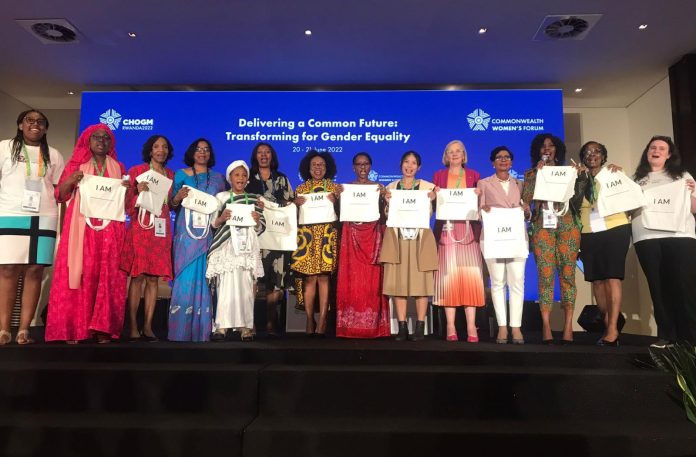Although treatable and preventable, cervical cancer is the most common cause of cancer death in some countries.
Leading experts have called on governments to accelerate cervical cancer elimination efforts across the Commonwealth, where it is estimated that one woman will die of cervical cancer every three minutes if no action is taken by 2030.
Today, cervical cancer researchers, policymakers, academics, advocates, civil society and political leaders gathered in Kigali for the first time since the pandemic, to discuss the current challenges, priorities, and strategies for cervical cancer elimination across the Commonwealth.
The event, which took place on the margins of the Commonwealth Women’s Forum, focused on the theme “Accelerating Cervical Cancer Elimination: Realities, Challenges and Opportunities”, and sought opportunities to expand the role of women leaders to be advocates for elimination.
Delegates recognised the fact that the Commonwealth carries a significant cervical cancer burden, particularly in low- and middle-income countries (LMICs) – despite having only 30 per cent of the world’s population, Commonwealth members account for 40 percent of global cervical cancer incidence and 43 per cent of cervical cancer mortality.
In her opening remarks, Dr Ruth Kattumuri, Senior Director of the Economic, Youth, and Social Policy Directorate at the Commonwealth Secretariat, stressed the urgent need for governments and health professionals to work together towards its elimination.
“Globally, cervical cancer is currently among the most pressing threats to women’s health. Of the four cancers affecting women globally, cervical cancer is the only one that has proven effective elimination strategies through the Human Papillomavirus (HPV) vaccine and early screening tools for pre-cancerous lesions.
“Unfortunately, progress has been slow because many low- and middle-income countries are experiencing challenges with access to screening tools and HPV vaccines. In addition, stigma and misconceptions surrounding cervical cancer is high. Hence there is an urgent need to work together to eliminate cervical cancer. And it requires bold strategic policies and actions by governments, health professionals and community organisations, involving women and youth in health advocacy, to improve awareness and address access challenges.”
As part of the event, delegates watched an excerpt of the documentary, Conquering Cancer, which aims to show the world that global cervical cancer elimination is possible for every woman and girl, and includes some case studies from the Commonwealth.
The event included a keynote address by Dr Princess Nono Simelela, Assistant Director-General for Family, Women, Children and Adolescents at the World Health Organization (WHO), who underscored the need for collective action to achieve the Commonwealth’s elimination targets by 2030 and achieve vaccine inequity in countries where the cancer burden is the highest. She said:
“We really should be very angry that in the 21st century we are still talking about women dying of cervical cancer when we have the tools, technology, and know-how [to eliminate it].
A discussion followed thereafter with experts from across the Commonwealth, including Professor Miriam Mutebi, Consultant Breast Cancer Surgical Oncologist and Board Director of UICC, Professor Marion Saville, Executive Director of the Australian Centre for the Prevention of Cervical Cancer, Professor Senait Fisseha, Director of Global Programmes at the Susan Thompson Buffett Foundation and Summer Ng, cervical cancer survivor and youth advocate.
Although cervical cancer is one of the most preventable and treatable forms of cancer, significant obstacles to achieving elimination remain. These obstacles include a lack of equitable access to quality medical countermeasures in LMICs and associated stigma, and misconceptions about the disease at the community level.
The Human Papillomavirus (HPV) vaccine and effective screening tools for pre-cancerous lesions are key tools to achieving elimination. However, as of 2020, only 13 per cent of girls aged 9–14 years were vaccinated against HPV globally.
The COVID-19 pandemic also put immense pressure on global health systems, especially those of developing countries with underfunded and under-resourced health systems, halting progress made over the last 20 years towards attaining health-related Sustainable Development Goals. This has, in turn, put the prevention and treatment of life-threatening diseases such as cervical cancer at risk.
If adequate steps are not taken to radically reduce the rising incidence of cervical cancer within the Commonwealth, the number of new cases of cervical cancer is expected to rise by 55 per cent (to 324,598) and deaths by 62 per cent (to 186,066 deaths) by 2030. This would equate to one woman dying of cervical cancer every three minutes.
Today’s event provided an important reminder that elimination is a health equity and social justice concern that transcends gender and demonstrates a health system’s preparedness to deliver care to its most disenfranchised. It was made clear that clearing the path to cervical cancer elimination requires combined joint efforts by many actors, including strengthening the role of women in health advocacy for cervical cancer elimination.
A set of recommendations was developed during the event calling Heads of Government to:
*Address the inequity of access to cervical cancer elimination tools, including ensuring equitable access to HPV vaccines and cervical cancer screening provisions, so that elimination can become a reality.
*Take steps to ensure that by 2025, girls in the Commonwealth have access to vaccination against HPV infection by age 13, in accordance with commitments made during the 33rd and 34th Commonwealth Health Ministers Meetings (CHMM), and country contexts.
*Increase investment in their national cervical cancer control plans, in alignment with the WHO Global Strategy for the Elimination of Cervical Cancer and the UN’s 2030 Sustainable Development Goals.
As part of its mandate, the Commonwealth Secretariat will continue working with key partners, including experts from the Commonwealth International Taskforce for the Elimination of Cervical Cancer, World Health Organisation, UICC and the International Network for Cancer Treatment and Research to advance collective elimination efforts based on these recommendations.
SOURCE: COMSEC/PACNEWS














